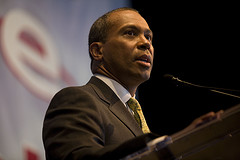Over the past year or so, former Massachusetts governor Deval Patrick has often appeared on lists of Democrats who might challenge Hillary Clinton in 2016. Last fall, he gave a pretty definitive statement that he had no plans to run. But those statements are cheap, and his entry into the race remained a possibility until today—when it was announced that he’s taken a job at Bain Capital. This is the career move of a Democrat who really has no ambition whatsoever to become president.
 It’s awkward for any prominent Democrat to sign up with Bain after President Obama’s reelection campaign, which relied largely on attacking the firm and what it symbolized in contemporary America. But it’s an especially striking move for Patrick, who is well-known as a good friend of the president. Perhaps to shield against the inevitable criticism, Patrick’s position will focus on investments with “significant, measurable social impact.” But this mildly ameliorative language is unlikely to sway anybody in the Democratic Party who sees signing up with Bain as proof positive of selling out.
It’s awkward for any prominent Democrat to sign up with Bain after President Obama’s reelection campaign, which relied largely on attacking the firm and what it symbolized in contemporary America. But it’s an especially striking move for Patrick, who is well-known as a good friend of the president. Perhaps to shield against the inevitable criticism, Patrick’s position will focus on investments with “significant, measurable social impact.” But this mildly ameliorative language is unlikely to sway anybody in the Democratic Party who sees signing up with Bain as proof positive of selling out.
For that reason, I find myself in the strange position of agreeing with Ed Morrissey, who also concludes that Patrick has clearly given up political ambitions: “First, [Bain] the brand itself is just too toxic, as are any Wall Street ties this explicit, among the progressive wing of the party.” But as Morrissey also notes, left-wing voters are likely to resent the fairly-liberal Patrick lending Bain a hand in repairing its image. For evidence of just how far Patrick has moved from the Democratic mainstream, consider recent moves by Hillary Clinton—hardly considered left-wing, and unrivaled among 2016 candidates. In her early policy signals and her announcement video, Clinton has taken clear steps to align herself more closely with economic populism, and to downplay her ties to Wall Street.
Patrick’s decision to do just the opposite shows, first of all, that he has probably abandoned forever any presidential ambitions he may have once harbored. It also illustrates the awkward position of many Democratic Party elites with regard to the finance industry. As a liberal governor of a liberal state, Patrick was probably less inclined than many Democrats to align himself with a firm like Bain—and his ties with Obama, in the wake of 2012, might have distanced him even further. But in the end, that turned out not to matter. For a former governor, there are lots of prestige positions available, and some of them might even be lucrative. But most jobs with “social impact” don’t come with a Bain Capital managing director’s salary. Patrick knew all of this when he took the job, and in many respects his position is unremarkable: most elite Democrats have an ambivalent relationship to finance. The party’s base, however, does not. Unless the party swiftly and unexpectedly changes direction, Patrick has probably stepped out of Democratic electoral politics forever.
Photo credit: WBEN-TV / Flickr
Click to
View Comments